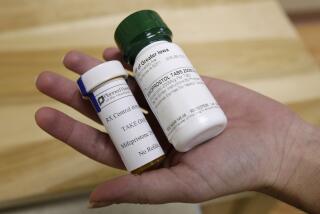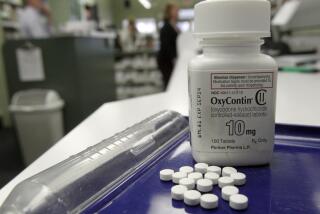A new wariness of prescriptions
- Share via
The market withdrawals of Vioxx and Bextra may have shaken arthritis patients by depriving many of them of the only medications that effectively treated their pain. But they also may have prompted a new wariness among patients and doctors about the safety of drugs in general.
According to an Internet-based poll of 231 primary care physicians, two in three doctors said they would be slower to prescribe new drugs in the future. And 80% of those responding are braced for more safety questions and more resistance from patients when they prescribe medications. Half said they believed it would be more difficult to persuade patients to start long-term drug therapy, such as regimens designed to lower blood pressure or cholesterol. And many doctors expressed concern that more patients would conclude that their established medications, too, might have unforeseen safety hazards and abandon their drug therapies on their own -- a potentially dangerous practice.
The survey, conducted by Philadelphia-based market research firm National Analysts, comes at a time when doctors’ groups, the FDA and Washington lawmakers are busy drafting proposals aimed at shoring up patients’ confidence in the safety of prescription drugs.
With a raft of legislative proposals circulating on Capitol Hill, the American Medical Assn. has proposed the creation of a databank of clinical trials that would let physicians know -- before research studies have been published and in cases where they are not published -- of potential safety hazards of medications. Other initiatives, including one introduced in early May by Rep. Maurice Hinchey (D-N.Y.), would reduce the pharmaceutical industry’s sponsorship of drug trials and make the federal government pay for them.
Dr. Rebecca J. Patchin, a pain doctor at Haider Spine Center in Riverside and a member of the AMA’s board of trustees, says that with patients “taking a more active interest in what the risks are,” physicians do not want to be blindsided by safety concerns they could not have discerned from published studies.
UCLA internist Ben Ansell says his patients -- many of them executives who are voracious consumers of news -- have always asked a lot of questions about the safety of medications he proposes. But in the wake of headline-grabbing drug withdrawals like the FDA’s decisions on Vioxx and Bextra, those questions escalate. “It does definitely heighten their concern -- particularly for new drugs and particularly for drugs in the same class” as those cited for safety concerns, he said.
And according to Ansell, physicians themselves aren’t immune to an outbreak of worry, especially when a pharmaceutical safety scare is dominating the news. At such moments, he says, “doctors tend to take the path of least resistance.” It’s difficult, he says, to communicate the precise meaning of risk-benefit calculations to patients, who basically want to know “What should I do?”
When safety questions arise, Ansell says, physicians tend to be conservative. Either doctors will hold off on prescribing a medication that might help but, down the road, may be found risky, or they’ll reach for one with a longer safety track record.
Susan Schwartz McDonald, chief executive of National Analysts, says patients and their physicians have grown more attuned to the risks of pharmaceuticals over time, fueled by greater public access to medical information on the Internet and more extensive media coverage of developments in medical research. But Merck’s withdrawal of Vioxx last September and the FDA’s recent decision to ask for the withdrawal of Bextra were watershed events, she added.
Since it was approved by the FDA in 1999, 84 million people worldwide have taken Vioxx, and an additional 7 million have taken Bextra since it was approved in 2002. Vioxx “had almost become a household term,” McDonald said. “It really reached into every household.” When its safety was questioned, she added, the resulting shaken confidence was a national phenomenon.
“I think it’s probably going to be longer-lasting than some of the other blips we’ve seen,” McDonald said. “It chastened not only physicians but patients, who were asking for these drugs.... It was a sobering reminder of how complicated risk-benefit calculations can be.”







